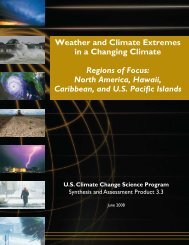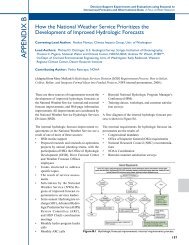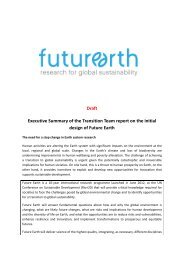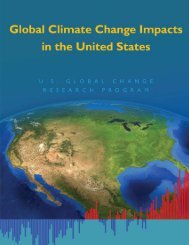Book 2.indb - US Climate Change Science Program
Book 2.indb - US Climate Change Science Program
Book 2.indb - US Climate Change Science Program
- No tags were found...
Create successful ePaper yourself
Turn your PDF publications into a flip-book with our unique Google optimized e-Paper software.
Abrupt <strong>Climate</strong> <strong>Change</strong>imposed freshwater flux (Gregory et al., 2005).Observations of the freshwater budget of theNorth Atlantic and the Arctic display a strongdecadal variability of the freshwater content ofthese seas, governed by atmospheric circulationmodes like the North Atlantic Oscillation(NAO) (Peterson et al., 2006). These freshwatertransports cause salinity variations (Curry etal., 2003). The salinity anomalies affect theamount of deep water formation (Dickson etal., 1996). Remarkably though, the strength ofcrucial parts of the AMOC, such as the sill overflowthrough Denmark Strait, has been almostconstant over many years (Girton and Sanford,2003), with a significant decrease reported onlyrecently (Macrander et al., 2005). It is thereforenot clear to what degree salinity changes willaffect the total overturning rate of the AMOC.In addition, it is hard to assess how strong futurefreshwater fluxes into the North Atlantic mightbe. This is due to uncertainties in modeling thehydrological cycle in the atmosphere (Zhang etal., 2007b), in modeling the sea-ice dynamics inthe Arctic, as well as in estimating the meltingrate of the Greenland ice sheet (see Sec. 7).It is important to distinguish between anAMOC weakening and an AMOC collapse. Inglobal warming scenarios, nearly all coupledGeneral Circulation Model’s (GCMs) show aweakening in the overturning strength (Gregoryet al., 2005). Sometimes this goes along with atermination of deep water formation in one ofthe main deep water formation sites (NordicSeas and Labrador Sea; e.g., Wood et al., 1999;Schaeffer et al., 2002). This leads to strongregional climate changes, but the AMOC as awhole keeps going. By contrast, in some simplercoupled climate models, the AMOC collapsesaltogether in reaction to increasing atmosphericCO 2 (e.g., Rahmstorf and Ganopolski, 1999):the overturning is reduced to a few Sverdrups.Current GCMs do not show this behavior inglobal warming scenarios, but a transient collapsecan always be triggered in models by alarge enough freshwater input and has climaticimpacts on the global scale (e.g., Vellinga andWood, 2007). In some models, the collapsedstate can last for centuries (Stouffer et al., 2006)and might be irreversible.Finally, it should be mentioned that the drivingmechanisms of AMOC’s volume flux are notnecessarily the drivers of the northward heattransport in the Atlantic (e.g., Gnanadesikanet al., 2005). In other words, changes of theAMOC do not necessarily have to affect theheat supply to the northern middle and highlatitudes, because other current systems,eddy ocean fluxes, and atmospheric transportmechanisms can to some extent compensate foran AMOC weakening in this respect.The result of all the mentioned uncertainties isa pronounced discrepancy in experts’ opinionsabout the future of the AMOC. This was seenin a recent elicitation of experts’ judgments onthe response of the AMOC to climate change(Zickfeld et al., 2007). When the twelveexperts—paleoclimatologists, observationalists,and modelers—were asked about theirindividual probability estimates for an AMOCcollapse given a 4 °C global warming by 2100,their answers lay between 0 and 60% (Zickfeldet al., 2007). Enhanced research efforts inthe future (see Sec. 8) are required in orderto reduce these uncertainties about the futuredevelopment of the AMOC.3. What is the Present Stateof the AMOC?The concept of a Meridional OverturningCirculation (MOC) involving sinking of coldwaters in high-latitude regions and polewardreturn flow of warmer upper ocean waters canbe traced to the early 1800s (Rumford, 1800;von Humboldt, 1814). Since then, the concepthas evolved into the modern paradigm of a“global ocean conveyor” connecting a small127






